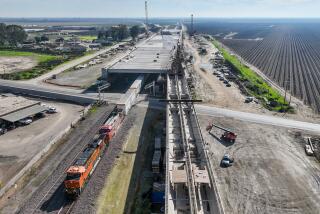Legislature approves first state audit of bullet train project since 2012
- Share via
After years of mounting delays and cost increases, the first formal state audit of the California bullet train project was authorized Tuesday by the legislature’s joint audit committee.
The decision comes after the rail authority disclosed this month that the cost of building the first 119 miles of track in the Central Valley would cost $10.6 billion, a 77% increase over the original estimate of $6 billion.
For the record:
9:40 a.m. Jan. 31, 2018An earlier version of this story wrongly stated that the audit was estimated to require 26,000 hours of work. It is estimated to require 2,600 hours.
The construction work underway is about seven years behind schedule and facing challenges acquiring property, designing safety measures and relocating underground utilities.
State Auditor Elaine Howle last reviewed the project in 2012, reporting a range of problems in management and planning. But she was not tasked for another audit, despite efforts by Republican legislators over the last two years.
The new request had bipartisan support, introduced by Assemblyman Jim Patterson (R-Fresno), a longtime bullet train critic, and Sen. Jim Beall (D-San Jose), a supporter of the project.
The committee vote was unanimous. But Republicans and Democrats on the panel disagreed on the scope of the audit.
Dante Acosta (R-Santa Clarita) asked that the audit include an assessment of whether the future system could operate without a state subsidy, as required by the 2008 bond act that provided $9 billion. Assemblywoman Catharine Baker (R-Dublin) asked whether the audit would examine the alternative economic benefits of other transportation projects.
Assemblyman Al Muratsuchi (D-Torrance), chairman of the committee, suggested that amending the audit request to include those provisions could delay approval of the audit until a future committee meeting. The subsidy issue will be addressed in the rail authority’s upcoming 2018 business plan, Beall noted, which is expected to be released in March.
Opponents of the project say it is likely to need hundreds of millions of dollars to billions of dollars in annual operating subsidies, based on California’s high costs and its projected low fares. But rail authority executives have insisted that their ridership models and business plans show a subsidy would not be required.
Beall reiterated the importance of linking Silicon Valley to the Central Valley in an initial phase of the project, which the rail authority had hoped to complete by 2025 at a cost of $21 billion. But the cost increases and delays have put that plan out of reach unless Gov. Jerry Brown and the Legislature can find new revenue sources or measures to drastically reduce the cost of construction. The linkage to Southern California will be an even more difficult objective.
In remarks to the committee, rail authority Chairman Dan Richard acknowledged that there have been delays and cost growth. “This is an appropriate time for this body to take a snapshot look at how we are doing,” he said.
Howle, who sent the committee members a list of tasks that she envisioned for the audit, said at the hearing that the tasks would consume 2,600 hours of work and take about seven months. The cost is estimated at $344,000.
The audit would examine the rail authority’s contracting practices and procedures, along with how it handles changes to contracts that result in higher prices and how it tracks invoices. In a related task, the audit would examine whether it could move faster and cut costs by cooperating with other transportation or rail agencies.
The audit would also include an evaluation of the project’s economic impact on communities. Supporters have made the case that it is directly and indirectly creating thousands of jobs in the Central Valley, helping to drive down chronically high unemployment. Assemblyman Joaquin Arambula (D-Fresno), a member of the committee, blamed lawsuits by the project’s opponents for the delays and cost increases.
Howle’s tasks also include reviewing small and disadvantaged business contracts and the project’s compliance with environmental goals.
Follow me on Twitter @rvartabedian
More to Read
Sign up for Essential California
The most important California stories and recommendations in your inbox every morning.
You may occasionally receive promotional content from the Los Angeles Times.











